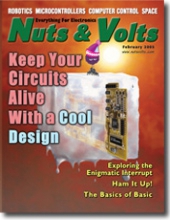Nuts and Volts Magazine
Features
PLCs or programmable logic controllers are industrial grade stand-alone computers that typically do not have monitors, keyboards, or mice attached to them as they operate. A stroll through almost any industrial plant of about any size will usually reveal dozens and dozens of PLCs controlling industrial processes ranging from control of simple conveyor belts up to specialized industrial machinery designed to automate extremely complex manufacturing processes.
Interrupts will become like the heartbeat of your microcontroller code, the regular rhythm at the core of your project.
A complete analog PID system. Part 2
Projects
When I got my first computer in the early 80s, there was an immediate attraction. Hours and hours of playing turned into weeks and weeks, which turned into months and months. I was hooked. Once I had the language down, the first thing I wanted to do was write a game. For my first game, I thought big...
Are you looking for a programmer that fits in your wallet? It’s here! Figure 1 shows a tiny device programmer that is only the size of a business card, but can be used to program Atmel’s many AVR microcontrollers (MCUs).
The Wart Remover originally came about by accident. I had a local infection, which was thought to be “hiding” from antibiotics, and so I sought to treat it with Crane frequencies — a range of electrical frequencies which supposedly destroy specific microbes.
Columns
In The Trenches
by Gerard Fonte
A Primer On Quality
Quality and quality control are important to the success of any product. Designing and producing a quality product is not accidental. In this column, we will examine those factors that are necessary for creating and manufacturing a quality product. We will also briefly touch on the ISO 9000 quality standards.
Open Communication
by Louis E. Frenzel
Back To The Bands - Part 2
Refer back to the December issue for all of the details. In this article, I will describe my experience with the QRP30 transmitter and the QAMP30 optional power amplifier.
Personal Robotics
by Mike Keesling
Basic Language Comparisons
As we approach middle age, we often try to re-assert our youth. For some, this manifests itself as an overwhelming need to buy a red Corvette, sunglasses, and possibly trade in the old wife for one with that “new wife smell.” For geeks like me, we remember the old days when a computer was powerful if it had a video screen, mass storage was something you did with an audio cassette, and Basic was this remarkable language that allowed you to make your computer do amazing feats...
The Design Cycle
by Peter Best
Mastering The Art Of DSP
Digital Signal Processing (DSP) is an art that has been applied to most every aspect of our everyday electronic existence. Your stereo’s CD player probably employs DSP technology and, if you own a fancy wireless home telephone, it will also most likely call upon the services of DSP.
Q&A
by TJ Byers
Q&A
In this column, I answer questions about all aspects of electronics, including computer hardware, software, circuits, electronic theory, troubleshooting, and anything else of interest to the hobbyist.
Just for Starters
by Mark Balch
Staying Cool
Small oversights can get you into trouble when you’re working with electronics. One factor to consider in every project — big or small — is ensuring that components do not overheat.
TechKnowledgey
by Jeff Eckert
Techknowledgey 2005
Events, Advances, and News
Stamp Applications
by Jon Williams
The Sheer Joy of Experimenting
Thankfully, most of my experiments since that fateful day have had better results and my dear mom smiles more than she fears for her first-born’s life. You’re probably wondering by now where in the world I’m going with this; well, let me tell you.

